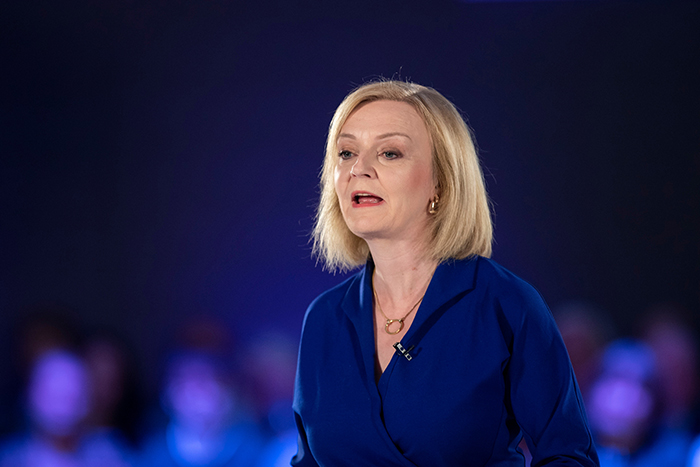
Former Prime Minister Liz Truss has backed Donald Trump in his battle for control of the Fed, adding that “a reckoning” is coming for the Bank of England, which should end in politicians taking charge of interest rates.
Truss, who was briefly Prime Minister in September and October 2022, said the UK “is in an economic doom loop of higher taxes, lower growth and higher debt. It is very difficult to see a political way out of that.”
She was speaking to Bloomberg’s Odd Lots podcast.
The former Prime Minister (pictured) added that this had been brought about by failed policies of the “mainstream economic establishment,” primarily in the Bank and the Treasury.
Her comments come as the cost of UK government borrowing jumped to near a 27-year high, as the yield on government 30-year bonds rose 8 basis points to hit 5.62% on Tuesday.
That pushed the UK’s long-term borrowing costs close to a spike in April of 5.66%, when 30-year bond yields reached their highest since 1998.
It also comes as Chancellor Rachel Reeves draws up measures, including planned hikes of property levies, to raise around £20bn of taxes to bolster the public finances ahead of the Budget in the autumn.
Truss said: “The Bank of England needs to be accountable to politicians. The current system doesn’t work. This is why I am very sympathetic to what Donald Trump is saying about the Fed.”
The US President has long called for Federal Reserve Chair Jerome Powell to resign because of what he sees as the central bank’s slowness in cutting rates to boost the American economy.
This week, Trump sent a letter to Fed board governor Lisa Cook, who has often voted in line with Powell over rates, dismissing her from her post over allegations of mortgage fraud.
“There is a reckoning coming for the central banks, not just in Britain, but also in the US and for the European Central Bank,” said Truss.
She added: “What we have seen in Britain is that people who have property and capital have done very well out of the low interest rates and easy money that the Bank of England has created over the last 15 years.
“But we are seeing young people struggle to get on the housing market and the real effects of Bank of England polices.”
Mainstream economists argue that politicians in charge of base rates would set borrowing costs to favour election cycles, rather than what was best for the long-term interest of the economy.
The former Conservative leader said that when Labour handed the Bank the power to set interest rates when it last came to power in 1998, the central bank was set on a path to become “pretty much unaccountable”.
She adds this was compounded when the David Cameron Conservative government established the independent government spending watchdog, the Office for Budget Responsibility, in 2010.
“Those policymakers [at the OBR and the Bank] are very influential with the markets,” said Truss.
Some economists on the right and left argue that OBR forecasts on government debt levels, which like all forecasts are educated guesses, have undue power to shape an administration’s policy.
Truss was forced to resign as Prime Minister shortly after her mini-Budget in September 2022, which set out plans for £45bn of unfunded tax cuts.
This sparked a meltdown across UK financial markets that led to hikes in mortgage rates, a fall in the value of the pound, the danger of widespread failure across the pensions industry and rises in the cost of UK government borrowing.



